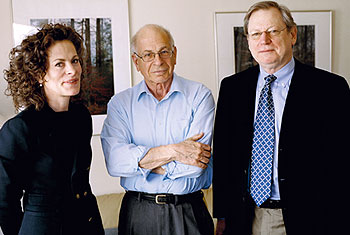The pursuit of happiness
Nobel laureate Daniel Kahneman on the mood-making impact of money, stress, and social relationships

Is satisfaction with one’s own life, including professional life, the decisive factor in determining whether employees and executives ultimately feel their work is worthwhile? And if so, what are the ways and means of generating such satisfaction? Talking to THE FOCUS, Prof. Daniel Kahneman provides some illuminating answers.
DANIEL KAHNEMAN doesn’t feel qualified to talk about the subject of reward. Other bright minds have doubtless given far more thought to what makes people tick and organizations successful, says the Nobel laureate. He can’t imagine what prompted him to agree to talk to THEFOCUS in the first place. “I must have had a reason,” he sighs, “but this is not my area of expertise. I study decision making and I study well-being…”
But isn’t well-being just another word for happiness, which is the state of mind – the ultimate reward – to which we all aspire? Happiness: a goal that releases immense amounts of drive and energy in everyone; a goal so important to America’s founding fathers that they anchored “the pursuit of happiness” in the Declaration of Independence as an inalienable right of every individual. Not only that, but some experts are seriously proposing that, once the basic needs of the population are met, economic policy should no longer be focused on boosting GDP but on raising the level of gross domestic happiness.
As Kahneman begins to speak, it rapidly becomes clear that he is indeed the right man for the job. As one of the founders of “behavioral economics” in the past he has studied how pleasant or unpleasant circumstances and memories influence our short-term mood and long-term satisfaction – not least in a professional context. As a result of his efforts in this direction, he is widely considered one of the trailblazers of what is now commonly referred to as happiness research.
What exactly is happiness? There is no easy answer, says Kahneman, a firm believer in precise scientific definitions: “Happiness itself is not easy to define. Actually I don’t like the word because there are multiple elements to the concept of happiness.” The important distinction, he says, is between experienced happiness, which is how you feel while you live, and satisfaction with your life, which is how you feel when you think about your life. In general terms, the two are not necessarily closely related. You can have people who are in a good mood but are not satisfied when they think about their lives, and people who are stressed or even depressed, but when they look at their lives as a whole they are fairly satisfied.
This also applies to employees and to executives in particular. “People don’t like stress or they say they don’t like stress. It’s not a pleasant emotion,” says Kahneman. On the other hand research reveals a positive correlation between the amount of stress that people report and their success in life. People who are more successful report higher levels of stress; the nations that report high levels of stress are the richer nations. And within any country, the more educated and richer population often report more stress than the less educated and poorer segments.
The Easterlin Paradox
The relationship between income and satisfaction with life is one of the most hotly debated topics in the context of economic happiness. For many years now, the debate has been dominated by the Easterlin Paradox, formulated in 1974 by the economist Richard Easterlin. Easterlin had found that, in many countries, any increase in happiness will not keep pace with growing prosperity.
Today there is a growing body of thought that says the Easterlin Paradox is partly mistaken, or at least misleading in the unequivocal nature of its conclusions. Kahneman generally lines up with the doubters – there is good evidence that in many countries rising standards of living have raised life stisfaction. On one important issue, however, he would agree with Easterlin: “Salaries and bonuses are a proxy for something else,” he argues, “a proxy for status, for example; the status an executive has attained.” That explains why, when talking about very well paid executives, it is really how much money they are getting relative to other people or compared to some standard benchmark that counts. It is above all the shift in relative income that is experienced as so positive, although the long-term effects of such changes may be very minor. “So I’m really very skeptical that paying people ten million is more motivating than paying them half a million,” says Kahneman.
This does not mean that financial incentives have no impact at all. It is just that the impact can also be negative, as is currently being documented by the catastrophic effect of bonus payments in the financial sector in particular, but also in other industries. The main problem with bonuses, Kahneman explains, “is that they are bound to create an orientation to the short term.” And indeed, recent research confirms that while money may not be the root of all evil, it doesn’t help build character. Kahneman tells of an experiment with students who had been set a specific task. On a table nearby was a computer with a screensaver running. In some cases this showed dollar bills floating in water. Then someone entered the room and “accidentally” dropped a handful of pencils. Interestingly, the people whose brains had been “primed with money” by the screensaver proved less willing to give up time to help pick up the pencils.
The research confirms that people whose minds are on money, consciously or not, are more selfish. They are less willing to help others or to accept help themselves. “Companies should consider this when it comes to individual bonuses,” suggests Kahneman. “If the aim is to create competition among people where they perform as individuals – selling insurance maybe or automobiles – you can see the point of individual bonuses; but they would be detrimental to group morale; detrimental to collaboration.”
How important a person considers pay and monetary aspects in general is decided early on in life. It will influence their choice of profession and the type of company they decide to work for. Kahneman recalls some research that concerned the questions put to students as part of their college entrance exam. On a scale from one to four, they were asked to indicate how important money was to them. Twenty years later, it emerged that, across all professions, each point on that scale equated to around 20,000 dollars in annual earnings. Those who were more strongly interested in money in their youth also ended up earning substantially more. The effect of income on life satisfaction was also predictable from early attitudes about money. “In general,” Kahneman sums up, “people who have more income describe themselves as more satisfied with life, but the effect of income is quite small among people who, at age eighteen, said they were not interested in money.”
The happiest nation on earth
While more money may not make you unhappier, it doesn’t automatically make you happier either. In this respect, other (and above all social) factors are at least as important, as Kahneman discovered. In order to assess their importance, he developed what he calls “the ladder of life”: “People are told to imagine a ladder with ten rungs – different levels of satisfaction with life. Ten is the best possible life in subjective terms and zero is the worst.” This enables very close statistical correlation between growing national prosperity and the average increase in satisfaction with life. That is not the whole story, however, because by this measure, the people who emerge as the happiest nation on earth are the Danes. They average a score of eight on the ladder of life. But while the Danes are a prosperous nation, they are by no means the most prosperous.
To explain why the Danes nevertheless top the rankings, Kahneman refers to the strong impact of social determinants in the personal happiness equation. One of the most important dimensions here is the level of mutual trust that pervades a society. From an economic viewpoint, this can be measured with the aid of the level of corruption in a country. Where corruption is rife, people will rarely trust one another and are unlikely to trust strangers at all. This of course impacts on their overall mood. The Danes, by contrast, in a country where corruption is rare, are very trusting of their fellow countrymen and generally assume that strangers are benevolent, which in turn enhances their mood.
The importance of trust, of functioning social networks, and of rewarding experiences such as a sense of personal security and a sense of belonging should not be underestimated in organizations and companies either, says Kahneman, because these factors build happiness. However, as the research with college entrants showed, it can take 20 years and more before it emerges whether an organization attracts the kind of people primarily interested in high salaries or the less materially oriented type. So even if there is a shift in values going on, meaning that in future it will no longer be the case – to quote Gretchen in Goethe’s Faust – that “to gold they tend, on gold depend,” then as Daniel Kahneman says: “Unfortunately it will be twenty years or so before we get to feel the social benefits.”

The Interview with Daniel Kahneman in New York was conducted by Ulrike Krause, THE FOCUS, and Ashley Stephenson, Egon Zehnder International, New York and Sydney.

Daniel Kahneman
Daniel Kahneman was born in Tel Aviv in 1934 and grew up in Paris. His parents, Lithuanian Jews, had immigrated to France in the 1920s and Kahneman lived there until 1946. He went on to study mathematics and psychology in Jerusalem and at the University of California at Berkeley. In 1993 he began teaching at Princeton University where today – following his retirement – he continues to pursue research as Senior Scholar at the Woodrow Wilson School of Public and International Affairs. One of his great contributions to economic science was refuting economists’ prevailing view of human beings as the predictably rational homo economicus. In 2002, along with various other honors and prizes, together with Vernon Smith, Kahneman was awarded the Nobel Prize in Economics for, in the words of the Nobel Prize Committee, “having integrated insights from psychological research into economic science, especially concerning human judgment and decision-making under uncertainty.”
PHOTOS: JÜRGEN FRANK





